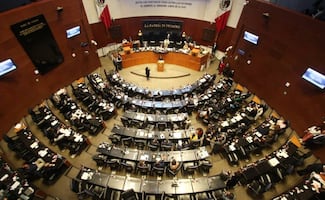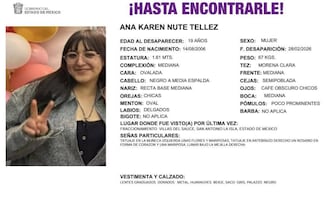Más Información

Jessica revive la nostalgia de la SEP en “Pancito Merge”; así se inspiró la ilustradora en el videojuego mexicano de Nintendo Switch

"El Mencho" tenía presentes a Los Alegres del Barranco; en cartas le hablaban del grupo musical que cantaba su corrido

Publican en el DOF decreto que reduce la jornada laboral a 40 horas; así aplicará la disminución año por año hasta 2030

Senado recibe iniciativa para acortar altas pensiones de exfuncionarios de CFE y Pemex; prevé ahorro de hasta 5 mil mdp anuales

“Ideal, aprobar el Plan General de Desarrollo antes del Mundial”: Patricia Ramírez, titular del Instituto de Planeación de la CDMX
The U.S. Supreme Court on Tuesday agreed to decide whether to revive a civil rights lawsuit filed by the family of a Mexican teenager against a U.S. Border Patrol agent who fatally shot the 15-year-old from across the border in Texas in 2010.
The justices will review an April 2015 ruling by the New Orleans-based 5th U.S. Circuit Court of Appeals that threw out the civil rights claims against the agent, Jesus Mesa, filed by the family of Sergio Hernandez.
The appeals court ruled that the lawsuit could not move forward in part because the U.S. Constitution's ban on unjustified deadly force did not apply to Hernandez because he was a Mexican citizen on Mexican soil when the shooting occurred in June 2010.
The incident took place at a border crossing between El Paso, Texas and Ciudad Juárez, Mexico.
The U.S. Border Patrol said at the time that Hernandez was pelting U.S. agents with rocks from the Mexican side of the Rio Grande before the shooting. U.S. authorities have asserted that Mesa shot Hernández in self-defense.
Lawyers for Hernández's family disputed that account, saying he was playing a game with other teenagers in which they would run across a culvert from the Mexican side and touch the U.S. border fence before dashing back.
The FBI also said Hernández was a known immigrant smuggler who had been pressed into service by smuggling gangs that took advantage of his youth. Hernández guided illegal immigrants into the United States, the FBI said.
Hernández's family sued both the U.S. federal government and Mesa. The Supreme Court appeal only concerns the claims against Mesa.
The case was seized on by activists who accused the United States of using heavy-handed tactics in dealing with immigration and human smuggling.
The shooting was condemned by Mexico's government and prompted demonstrations in Ciudad Juárez.
The court will hear oral arguments and decide the case in its current term, which ends in June. The justices also announced on Tuesday that they will hear three related cases on a similar legal question concerning whether immigrants detained after the Sept. 11 attacks who said they faced abusive treatment can sue government officials.
Noticias según tus intereses
[Publicidad]
[Publicidad]









